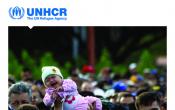Mexico
Operation: Mexico
Location
{"longitude":-103,"latitude":25,"zoom_level":5,"iso_codes":"'MEX'"}
By clicking on the icons on the map, additional information is displayed.
Key Figures
| 2017 year-end results | |
| 31,720 | individuals were informed on their right to seek asylum |
| 7,730 | people of concern received cash-based assistance |
| 5,490 | people of concern were accommodated in shelters supported by UNHCR |
| 1,290 | people of concern were released from detention |
| 2018 planning figures | |
| 10,000 | people of concern will be accommodated in shelters |
| 6,300 | households will receive multipurpose cash-based assistance |
| 6,000 | people of concern will receive support to access to employment |
| 5,700 | people of concern will receive legal assistance |
Latest Updates and Related Links
People of Concern
107%
Increase in
2016
2016
| 2016 | 8,862 |
| 2015 | 4,286 |
| 2014 | 4,722 |

[["Refugees",6202],["Asylum-seekers",2647],["Stateless",13]]
Loading ...
Mexico
< Back
2017
{"categories":[2013,2014,2015,2016,2017,2018],"budget":[3.09862171,2.99046312,4.08857563,12.51904304,14.73228739,17.78826491],"expenditure":[2.21493065,1.99483238,2.62872464,6.73662723,9.61744232,null]}
{"categories":[2013,2014,2015,2016,2017,2018],"p1":[3.09862171,2.99046312,4.08857563,12.51904304,14.73228739,17.78826491],"p2":[null,null,null,null,null,null],"p3":[null,null,null,null,null,null],"p4":[null,null,null,null,null,null]}
{"categories":[2013,2014,2015,2016,2017,2018],"p1":[2.21493065,1.99483238,2.62872464,6.73662723,9.61744232,null],"p2":[null,null,null,null,null,null],"p3":[null,null,null,null,null,null],"p4":[null,null,null,null,null,null]}
Loading ...
CHOOSE A YEAR
- 2015
- 2016
- 2017
- 2018
Operational context
The main drivers of forced displacement, including violence and persecution by organized criminal actors, persist in the North of Central America resulting in an increasing number of people fleeing violence to seek international protection in Mexico. In 2017 UNHCR observed a significant surge in the number of asylum-seekers from Venezuela, the second most common country of origin after Honduras.The September earthquakes damaged the office of the Mexican Refugee Commission (COMAR) in Mexico City leading to an increased refugee status determination (RSD) processing times. This had an impact on the shelters’ capacities, on service providers, including UNHCR’s partners, and more importantly on the access to rights for asylum-seekers.
Concerns remain over the limited capacities of the authorities to conduct adequate screenings to identify individuals with potential international protection needs, together with the absence of mechanisms to adequately inform people on their right to seek asylum.
Population trends
In 2017, close to 14,600 people claimed asylum in Mexico, representing a 66 per cent increase compared to 2016. Only 2,825 people, some 63 per cent of those applicants who concluded the RSD procedure (4,475), were recognized as refugees or received complementary protection, a decrease of 7 per cent compared to 2016.UNHCR estimated a significant higher increase in claims. However, the difficulties faced by COMAR to fully resume its operations after the earthquakes resulted in an impact on the processing of claims leading to a backlog of 7,719 applications, an increase of 496 per cent compared to 2016.
Key achievements
- UNHCR and partners carried out 657 monitoring visits to 17 detention centers in 13 States. More than 13,400 potential asylum-seekers were informed on their right to claim asylum and on the asylum procedure.
- Two new shelter projects were initiated, increasing the reception capacity of the sites with 70 additional spaces, to accommodate a minimum of 2,070 people.
- More than 7,000 people of concern received legal aid including individual legal advice and legal representation.
- 136 individuals were relocated to Saltillo between 2016 and 2017 to improve their local integration prospects.
- The Government of Mexico joined five other Central American countries in adopting the San Pedro Sula Declaration, which includes 39 concrete commitments to improve the refugee response in Mexico, such as stepping up dissemination of information on access to asylum; increase the capacity of shelters to provide alternatives to detention; grant asylum-seekers access to the national health system and state social social programmes.
Unmet needs
The capacity to effectively implement a comprehensive durable solutions strategy remained a major gap in UNHCR’s operation in Mexico. While the country has a significant potential to integrate refugees, the persistent lack of resources by UNHCR to more efficiently coordinate and build networks around integration objectives continued to affect refugees both in Mexico City and Southern Mexico.Working environment
Violence and persecution, caused mostly by criminal groups in the Northern Triangle of Central America (NTCA), continues to trigger the forced displacement of civilians towards Mexico. The number of asylum applications registered by the Mexican Commission for Refugees (COMAR) in the first four months of 2016 (2,100) indicate a 259 per cent increase over the same period in 2015 (584). The number of unaccompanied children who applied for refugee status from January to April 2016 increased by 132 per cent compared to the same period in 2015. The protection capacity of key authorities (Instituto Nacional de Migracion, Comisión Mexicana de Ayuda a Refugiados, Desarrollo Integral de la Familia ) falls short of what is required. The COMAR’s limited capacity and lack of presence in key border locations and other areas of the country poses a serious problem to the country’s asylum system. UNHCR will seek to support the Government through provision of human resources, training and other support to COMAR, and delivery of technical advice to INM.Key priorities
• In 2017, UNHCR’s priority will be to ensure access to asylum procedures and reduce the risk of refoulement. Through mass information campaigns, an intensification of detention monitoring and engagement with faith-based shelters, UNHCR aims to reduce the risk of refoulement against people who are not informed on how to access asylum procedures, or who are identified as in need of international protection.• UNHCR will also continue to assess and map emerging humanitarian needs, particularly in relation to shelter. The Office will focus its efforts on long-term shelters used by those seeking asylum.
Limited funds will impact the number of individuals with international protection needs that UNHCR will provide information to on the possibility of obtaining protection in Mexico. At least 10,100 individuals will not receive information on government refugee status determination procedures.
